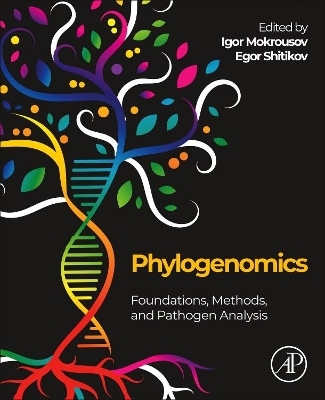
Phylogenomics
Academic Press Inc (Verlag)
978-0-323-99886-4 (ISBN)
Igor Mokrousov, 53 years old, PhD, DSc, is the Head of Laboratory of Molecular Epidemiology and Evolutionary Genetics at St. Petersburg Pasteur Institute, Russia. His research interests include study of evolution, phylogenomics, and molecular epidemiology of tuberculosis; phylogeography of Mycobacterium tuberculosis and co-evolution with humans; molecular mechanisms and genotypic detection of drug resistance. His current projects focus on the application of next-generation sequencing for genome-wide analysis to understand the pathogenetic characteristics and evolutionary trajectory of various M. tuberculosis lineages and emerging clones. Dr Mokrousov made a recognized contribution to the study of human-M. tuberculosis coevolution and put forward a hypothesis that evolutionary histories of H. sapiens and human pathogens are comirrored and coshaped. He proposed a new simple measure of genetic distance between geographic populations within a microbial species based on the observed difference in the frequencies of its genotypes. Egor Shitikov, PhD, is the Head of Laboratory of Molecular Genetics of Microorganisms at Federal Research and Clinical Center of Physical-Chemical Medicine, Russia. His research interests are closely related to the systematic analysis of Mycobacterium tuberculosis: phylogenetic relationship of various strains, their definition and classification; the search for new drug-resistance determinants, virulence factors, and pathogenicity; development of rapid screening systems for certain pathogen groups; experiments on model organisms. The current topic focuses on the deep machine learning methods in Mycobacterium tuberculosis genomics for the building of an open platform for the analysis of the pathogen’s evolutionary signatures.
PART I. GENERAL TOPICS AND FOUNDATIONS 1. Phylogenomic analysis and the origin and early evolution of viruses 2. Application of Next Generation Sequencing for Genetic and Phenotypic Studies of Bacteria 3. Genomic insight into deciphering bacterial outbreaks 4. Drug resistance in bacteria, molecular mechanisms and evolution 5. Virulence evolution of bacterial species PART II. METHODS IN THE PHYLOGENOMICS 6. Modeling evolutionary changes of k-mer patterns of bacterial genomes 7. Clock Rates and Bayesian Evaluation of Temporal Signal 8. Microbial evolutionary reconstruction in the presence of mosaic sequences 9. Tools for SNP calling and the way to deal with big datasets PART III. PHYLOGENOMICS OF SPECIFIC PATHOGENS 10. Phylogenomics of Yersinia pestis 11. Salmonella Phylogenomics 12. The phylogenomics of Shigella spp. 13. Phylogenomic diversity within Corynebacterium diphtheriae, a re-emerging threat to global public health 14. Phylogenomics of the East Asian lineage of Mycobacterium tuberculosis 15. Mycobacterium kansasii 16. Taxonomy and phylogenomics of Leptospira 17. Phylogenomics and evolution of Measles virus 18. Phylogenomics of HIV-1 19. Respiratory syncytial virus 20. Phylogenomics of Flaviviruses 21. How clonal is Staphylococcus aureus? 22. Genomic research of ancient pathogens in Central Asia 23. Subspecific nomenclature of the Cryptococcus neoformans/gattii complex and the predominant clonal evolution (PCE) model 24. Phylogenomics of Mycobacterium leprae
| Erscheinungsdatum | 02.05.2024 |
|---|---|
| Verlagsort | Oxford |
| Sprache | englisch |
| Maße | 191 x 235 mm |
| Gewicht | 1260 g |
| Themenwelt | Informatik ► Weitere Themen ► Bioinformatik |
| Studium ► 2. Studienabschnitt (Klinik) ► Humangenetik | |
| Naturwissenschaften ► Biologie ► Evolution | |
| Naturwissenschaften ► Biologie ► Genetik / Molekularbiologie | |
| ISBN-10 | 0-323-99886-0 / 0323998860 |
| ISBN-13 | 978-0-323-99886-4 / 9780323998864 |
| Zustand | Neuware |
| Informationen gemäß Produktsicherheitsverordnung (GPSR) | |
| Haben Sie eine Frage zum Produkt? |
aus dem Bereich


